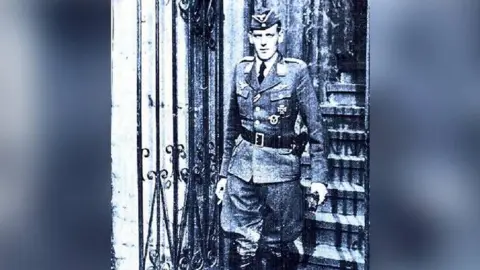World War Two: German bomber's medal returned to family
 FAMILY PHOTO
FAMILY PHOTOA German pilot's World War Two medal has been returned to his family more than 80 years after his death.
When Güenter Brixius crashed into Llanhailo Farm in Radnorshire - which is now Powys - in April 1942, he was a decorated Luftwaffe pilot at 26.
He received the Iron Cross in 1939, and it has now been returned to his family in Münster, near Dortmund.
The farm occupiers' son found Brixius's relatives in a "contribution to the friendship of both countries".
Brixius' Junkers Ju-88A-6 bomber plane took off from occupied Belgium and was shot over the Bristol Channel, having already lost radio and navigation on a cloudy night.
The aircraft limped to Hereford, where it was intercepted by an RAF Beaufighter dispatched from the Shrewsbury area, which dealt the fatal blow.
The main bombing raid was on Bath, but Brixius's flight was on a diversionary path to draw RAF fighters away from the main pack.
After hitting the hillside in Hundred House, his body and that of his gunner Adolf Liessig were laid out by members of the local military in the farm's granary, where Brixius's Iron Cross was either lost or discarded.
Gareth Bufton, one of eight children who grew up on the farm, handed over the medal in a meeting of the two families in September.
Although he wasn't born until 1958, Mr Bufton said the medal was "in our family's possession for years" and "we weren't entirely sure why we were holding on to it".
 FAMILY PHOTO
FAMILY PHOTOHe added: "After mum died, we knew it didn't belong with us anymore, and that there was a family somewhere in Germany who'd cherish this recognition of his bravery."
Brixius's nephew, Ulrich Brixius, said: "We find it a big gesture of friendship from Gareth, to a family in Germany. It is surely a contribution to the friendship of both countries."
The crash happened in the early hours of the morning, but Mr Bufton said his family remained blissfully unaware of what had happened until much later that day.
"The crash seemed to have happened around my family. Despite people saying the impact could be heard 20 miles away, my parents and my then baby sister Connie slept right through it," he said.
"The first they knew was when they got up for milking the following morning, and looked out of the kitchen window to see all the comings and goings.
"None of them were allowed anywhere close, as there was still ammunition exploding, and I don't think they wanted them to see the bodies."
Although the radio operator and navigator were able to parachute out and spend the rest of the conflict as prisoners of war, Brixius and Liessig stuck with the stricken plane and attempted to bring it down safely until it finally crashed into sheep pasture on the farm's hill.
They were buried a few days later at Glascwm Church, before being transferred to a German war cemetery at Cannock Chase in Staffordshire.
But after the bodies were taken away and the granary was handed back, Mr Bufton's parents, Jack and Muriel, found the lost Iron Cross embellished with the swastika.
"We'd always talked about finding the family, we knew who it belonged to, but before the internet it was a much harder job to track people down than it is today," said Mr Bufton.
 FAMILY PHOTO
FAMILY PHOTO"Mum moved out of the farm when my brother took over its running, and after that it stayed packed up in a box until she died."
Alongside his wife Yvonne - who had worked in Germany and realised she knew people from Brixius's hometown - Mr Bufton managed to piece together the details.
Ulrich Brixius said his uncle was "a charming young man who loved to play violin and hockey" and the third son of four children, born in Essen, North Rhine-Westphalia.
He said that sadly he knew little else about him, as his father's three brothers had all been killed in action.
The family do not know why Brixius had been awarded the Iron Cross but, because it was given in September 1939, it was assumed it was for action over Poland or the Sudetenland.
